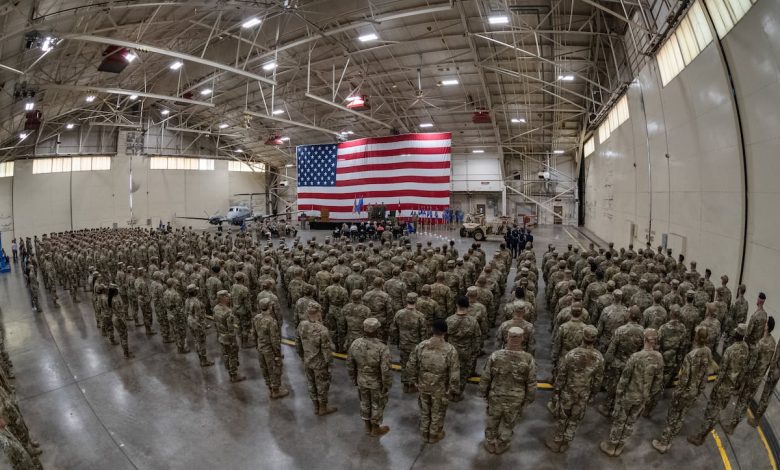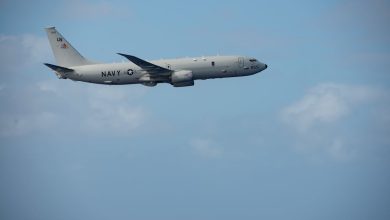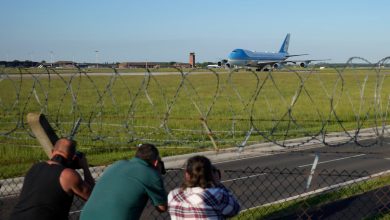The National Guard is in the crosshairs. Congress can save it

For nearly 400 years, the National Guard has been America’s protectors on the home front. But the existence of the National Guard as we know it is now being seriously challenged.
Congress is poised to adopt language in the annual National Defense Authorization Act that would override governors’ authority over National Guard units. Adoption would seriously damage our national security, imperil military readiness, and infringe upon longstanding gubernatorial authority over National Guard units.
The good news is Congress has an opportunity to change course.
Earlier this year, the Department of the Air Force submitted Legislative Proposal 480, which aims to circumvent federal law requiring governors to consent to any transfer of National Guard units out of their respective states.
The end goal is to take Air National Guard units performing space missions out of their states and forcibly integrate them into the U.S. Space Force. This override of established federal law raised serious concerns within the National Guard community and united the nation’s 55 state and territorial governors in opposition to it.
The governors’ position is noteworthy.
It is rare that leaders of contrasting regional, political, and geographical constituencies find common ground on an issue. Their April statement against LP480 is focused on the potential impact on more than 450,000 Army and Air Guardsmen.
We share the view of the governors that LP480 “disregards gubernatorial authorities regarding the National Guard and undermines over 100 years of precedent as well as national security and military readiness.”
Over the last century, units have moved from one state to another. Or, as happened after World War II, units were dissolved. However, in every case, those actions were taken with the consent of the affected governors as required by law. In all our discussions with proponents of LP480, we’ve yet to receive an explanation as to why the law should no longer apply.
The National Guard Association of the United States, along with our partners, spent the last six months trying to find a solution to the LP480 problem. We have attempted to work directly with the Department of the Air Force to find a mutually beneficial arrangement that would not erode decades of federal law and create a capability gap in our national security infrastructure. We have also informed Congress on the potential detrimental effects that LP480 would have on our national security, including data which shows most affected airmen will not join the Space Force. The loss of these highly trained professionals would be immense.
The concern about precedent is not irrational. Currently, the Air Force is developing its cyber capabilities, in part, relying on a new Air National Guard unit. The Army Guard has the 91st Cyber Brigade with units in more than 30 states.
If LP480 is approved, the path for the federal government to avoid obtaining governors’ consent is open. What could come next? How would we prevent moving a C-130 wing out of a state and putting it into the active component? Or taking a brigade combat team out of the Army Guard and putting that into the active component?
Secretary of the Air Force Frank Kendall stated this is a “unique situation,” a one-off. Will the next secretary agree? Or another service chief? Readiness and force cohesion undoubtedly would suffer.
Furthermore, if those Airmen are moved into the Space Force, they lose access to State Partnership Program to support USSPACECOM/USSF priority security cooperation requirements.
At times, we have come close to reaching a compromise where there is a give and take on both sides of the disagreement. However, the intransigence and stubbornness of unelected Pentagon policymakers has prevented an amicable agreement from being reached. The good news is Congress has an opportunity to solve the problem with a consensus solution.
U.S., Rep. Joe Wilson, R-S.C., courageously led efforts to amend the House version of the NDAA, addressing the concerns of the governors and Guard community. This language preserves the authority of governors while also providing a potential pathway for a voluntary transfer of the Guard units in question. Most importantly, it will prevent any capability gaps in our national security infrastructure. Should both chambers of Congress adopt the House language in the final version of the bill, the problem will solve itself and take one of many tasks off the Congressional to-do list.
In addition to following the law and ensuring national security, Congress should also take note that the next presidential administration may not be in favor of LP480. Vice Presidential candidate Gov. Tim Walz is an opponent of LP480 and signed the letter against it earlier this year.

While Vice President Kamala Harris has not weighed in, it would be unwise for Congress to move forward with LP480 in its present form less than two months from election day. Additionally, former President Donald Trump is a supporter of establishing a Space National Guard – something which would be practically impossible should LP480 be adopted as currently written. We can all agree the next commander in chief should not be prevented from pursuing their vision for the armed forces before they are even sworn into office.
Secretary Kendall told The War Horse in a late May interview that the Air Force “can live with any result that comes out” of the debate over LP480. He added that if the Airmen with space missions “stay in the Air Guard, we’ll make that work.” Given an increasing reliance upon the Guard at home and abroad, we need to find a solution that recognizes the National Guard is an asset to our national security, not an impediment. Our soldiers and airmen continue to answer the nation’s call, just as they have done for centuries.
We urge the Senate to adopt the House version of the NDAA which maintains the governors’ authorities in accordance with longstanding law and also allows for the transfer of the units.
Frank McGinn is a retired Massachusetts Army National Guard major general and the president of the National Guard Association of the United States.
Read the full article here





